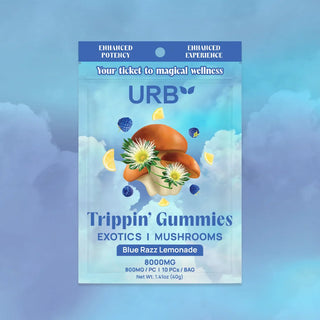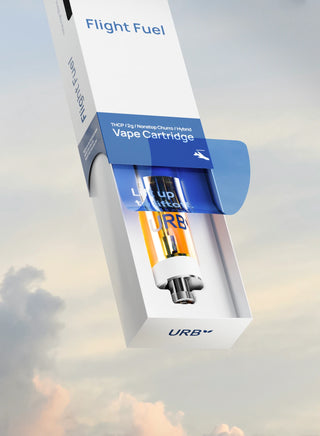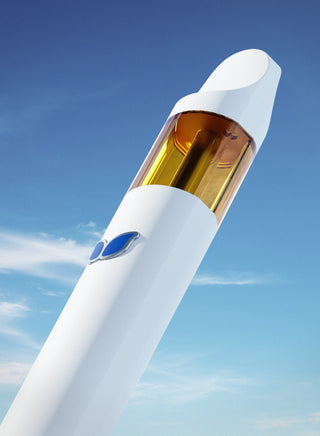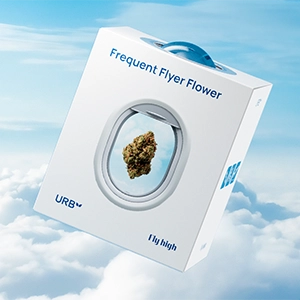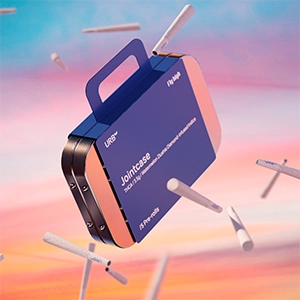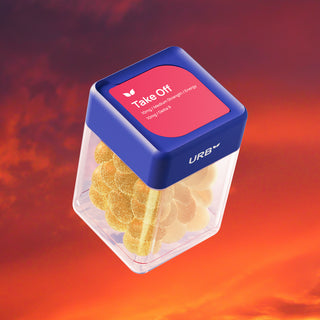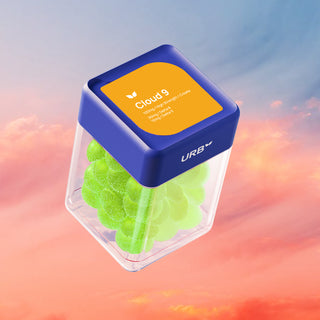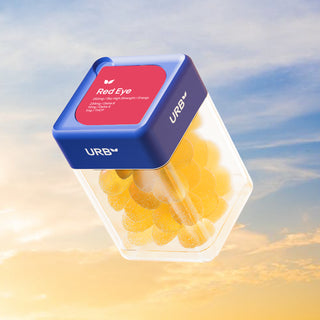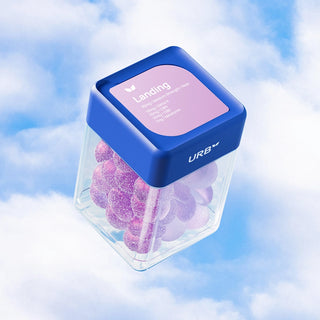With so many products and acronyms in the cannabis world, it’s easy to feel overwhelmed. That’s where we come in. And in this guide to the key differences between two popular cannabinoids—CBD and CBG—we’ll share real-world knowledge and actionable info you can use.
Here’s one way to think about it: CBD is like a soothing playlist that helps you wind down. CBG is more like a gentle morning stretch, it supports clarity and balance as you get moving. Both are naturally occurring, non-intoxicating cannabinoids found in the cannabis and hemp plants. And while CBD and CBG share some similarities, they also have some key differences in terms of how they interact with our bodies and impart their benefits and effects.
What This Post Will Cover
Some of the questions we’ll tackle in this guide to CBD vs CBG include:
-
What is CBD?
-
What is CBG?
-
How do CBD and CBG work in the body?
-
CBD vs CBG: Key differences
-
Can you take CBD and CBG together?
-
Reported benefits of CBD vs CBG
-
Potential side effects of CBG and CBD
-
CBG vs CBD: Which one should you choose?
Ready? Let’s get rolling.
What Is CBD?
Cannabidiol (CBD) is a naturally occurring compound found in the cannabis and hemp plant. In the last decade or so, it’s gotten a huge deal of attention thanks to its potential health benefits and non-intoxicating properties. But while it’s the second most abundant cannabinoid present in cannabis after tetrahydrocannabinol (THC), it doesn’t produce an intoxicating effect like THC does. Instead, most people report it imparts feelings of calm, balance, and offers gentle wellness support.

Most of the CBD we ingest actually comes from the hemp plant, where it’s even more abundant than it is in cannabis. In our bodies, CBD interacts with the endocannabinoid system (ECS), the bodily network that does so much to help us regulate memory, immune function, and more.
What’s unusual about CBD is that it doesn’t readily bind with the CB1 and CB2 receptors in the ECS. Instead, it helps modulate how other cannabinoids interact with them, and also stimulates our body’s own cannabinoids, the compounds known as endocannabinoids.
What Is CBG?
CBG is short for cannabigerol, and like CBD it’s a non-intoxicating cannabinoid found in cannabis and hemp. While it’s linked with some highly useful effects, the CBG cannabinoid serves another, very unique purpose: It’s the “stem cell” or “mother cannabinoid” to all the other ones. That’s because partly through the growing cycle, CBG’s chemical precursor—the cannabinoid known as cannabigerolic acid (CBGA)—breaks down under heat or UV light to form enzymes that in turn produce THC, CBD, CBG, and other cannabinoids.

As we’ll explore in greater depth in a moment, CBG is associated with a number of potential effects, including a gentle, supportive focus and the potential for increased energy and alertness. But there’s a problem: Because many modern hemp strains are bred to be high in CBD, they contain very little CBG. However, experimenting with breeding, genetic manipulation, and harvesting techniques can boost the level of CBG so that the hemp plant contains high amounts of both CBD and CBG.
On top of that, progress in advanced lab processes has opened up another source of this intriguing compound. And as interest in the CBG cannabinoid increases, we’re likely to see even more of it hit the market.
CBD vs CBG: How Do They Work in the Body?
Like all cannabinoids—and even some terpenes—CBD and CBG interface with cannabinoid receptors in the endocannabinoid system (ECS) to impart their specific blend of effects. And it’s exactly how they do it that in large part determines what the experience they impart will feel like.
Take the CB1 receptors. Found mainly in the brain, spinal cord, and certain internal organs including the liver, kidneys, and lungs, they’re associated with regulating psychoactivity, anxiety and euphoria, and other emotional responses (it should come as no surprise THC binds strongly to CB1).
By comparison, CB2 receptors are found primarily in cells of the immune system and the intestinal tract, among other places. And as we referenced a moment ago, they’re more associated with regulating inflammation and immune response than imparting psychoactive or intoxicating effects.
When CBD and CBG interact with these and other receptors, they produce similar but distinct effects. CBG tends to feel more targeted, imparting gentle focus, clarity, and even mild energy. CBD is more broad; you might not feel a burst of energy, but might instead feel an overall sense of balance and calm.
CBD vs. CBG: Key Differences
How do you compare CBG vs CBD? If CBD is the chill friend who grounds you, CBG is the focused one helping you cross things off your list. Here’s a side-by-side comparison to help you understand:
CBD
Origin: Occurs naturally in cannabis and hemp, but most commonly sourced from hemp.
Effects: Imparts broad-based feelings of calm, balance, and wellness support. Also linked by clinical research to reductions in anxiety, insomnia, and inflammation such as chronic pain.
Uses: Often taken to help support overall wellness and balance. Also has demonstrated anti-inflammatory benefits.
CBG
Origin: Occurs in trace amounts in cannabis and more in hemp—especially when harvested early in the plant’s growth cycle.
Effects: Imparts targeted feelings of gentle energy, supportive focus, and the potential for increased alertness. Early research suggests it may help reduce anxiety and stress and have anti-inflammatory, antioxidant, and neuroprotective benefits.
Uses: Typically taken for specific outcomes such as increased focus and better mood. Studies suggest it may also address anxiety and stress without the sedative effects of some other compounds.
Can You Take CBD and CBG Together?
What happens when you take CBG and CBD products together? Rather than conflicting, many people find they support each other.
That’s thanks to the entourage effect, the theory that cannabinoids (and even some terpenes) can interact to modulate and potentially strengthen each others’ effects. It’s now believed to be one of the major reasons cannabis and hemp are able to impart such a wide range of highly specific effects. And here at URB, it’s a key reason we use CBD and CBG together for targeted outcomes.
For instance, we use them in partnership in our Boarding Skybites, where the cannabinoids blend to impart their subtle mood-enhancing effects.
Reported Benefits of CBD vs CBG
Thus far we’ve mostly talked about the sensory experience of CBG vs CBD and how they interact with one another. But a growing body of research suggests these compounds may impart a variety of benefits, too. Here’s a few that might support your own health and wellness goals.
Potential Benefits of CBD
We know that many people turn to CBD for its gentle balancing effects. Research also suggests it may offer anti-inflammatory properties, and relief from symptoms of anxiety and stress by influencing serotonin receptors. And those same calming properties that help CBD support balance may also help people grappling with insomnia find deeper, more restorative sleep.
Potential Benefits of CBG
What about the potential benefits of CBG? Early clinical signs are promising: One study from 2024 found that CBG reduced feelings of anxiety in test subjects, while a follow-up review of the medical literature suggests CBG might have therapeutic benefits on inflammation and pain response and could even protect against neurodegenerative diseases.
Of course, we should point out that these are largely preliminary studies, and that individual experiences with cannabinoids can vary based on delivery method, dose, and body chemistry. As with so much in the cannabis realm, more studies are needed to verify these benefits and one day lead us to even better, more targeted cannabinoid combinations and formulations.
Potential Side Effects
Taking any compound introduces potential side effects, and CBD and CBG are no exception. Research and consumer surveys report the possibility of such side effects as:
As further research supports, where you source these cannabinoids from makes a big difference. We strongly recommend you only purchase high-quality CBG and CBD that’s been lab-tested by a trusted purveyor.
Here at URB, we believe that using cannabinoid products should spark curiosity and bliss—not worry. That’s why we rely on trusted safeguards like rigorous third-party verification, open access to our certificates of analysis, and legacy products such as our meticulously prepared and award-winning Pegasus-certified oil, so trusted it has become an industry standard.
Which Cannabinoid Should You Choose?
If you’re weighing using CBG vs CBD, how do you decide? One way to think about it is by assessing your own goals and what effect you’re going for:
-
Looking for sustained, daily calm? Try CBD for long-term calm, balance, and wellness support.
-
Looking to spark creativity? Try CBG for a gentle lift, focus, and the potential for increased energy alertness.
-
Seeking focus + balance? Try CBD and CBG together for the winning combination of long-term balance, heightened focus, and calm.
At the end of the day, both cannabinoids have their place. What matters most is matching the right option to your needs.
Elevate Your Routine with URB
CBD and CBG each bring their own strengths to the table. If you’re looking for steady balance and physical calm, CBD is a solid go-to. If mental clarity and focus are your priority, CBG may be the better fit. The right choice is the one that aligns with your body, your goals, and the kind of support you’re seeking.
Ready to try CBD or CBG for yourself? Shop URB for thoughtful cannabinoid blends designed to support every journey. Check out our Gummy Getaway Aruba gummies for a balanced blend of THC and CBD, or our Boarding Skybites, an uplifting blend featuring CBG, CBD and CBC.
CBD vs CBG: FAQs
1. Does CBG feel like THC?
No. Like CBD, CBG is non-intoxicating. While it may promote clarity, focus, and a gentle lift, it won’t cause the classic euphoric effects associated with THC.
2. Can you take CBG and CBD at the same time?
Yes. Many people combine them to benefit from the entourage effect, where cannabinoids may support and even enhance each other’s effects.
3. How long does it take to feel the effects of CBD vs CBG?
That depends on the format. Gummies and tinctures may take 30–90 minutes, while inhaled products work within minutes. The effects of both are usually described as subtle and supportive.
4. Is CBG stronger than CBD?
Not necessarily, they act differently. CBD is known for broad calming balance, while CBG is often described as more targeted, clear, and gently uplifting.
5. Are CBD and CBG safe to use every day?
Most people tolerate both well, but potential side effects include mild digestive issues, fatigue, or dry mouth. Always start with a low dose and choose products with third-party lab testing for safety and consistency.
